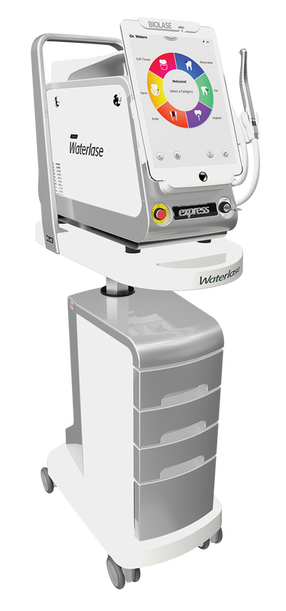What Is "Waterlase"?Waterlase Dentistry is one of the most advanced dental treatments available today. Waterlase uses a patented technology that combines focused light energy with a stream of water for a highly precise, exceptionally gentle dental experience. |
Waterlase allows your Endodontist to perform a wide range of procedures with benefits including:
|
|
Waterlase is used by doctors every day, and has helped over 27,300,000 smiling patients worldwide!
|
|
1) MORE COMFORTABLE
Waterlase Dentistry is a kinder, faster, more effective alternative for traditional endodontic therapy. Working deep into the dentinal tubules, Waterlase uses laser energy and a gentle spray of water that cleans and kills bacteria (up to 96%) decreasing the use of harsh chemicals providing a more holistic approach. |
2) FASTER TREATMENT
Working deep into the dentinal tubules to kill bacteria decreasing the use of medicinal irrigation, Waterlase achieves a significant reduction in bacterial counts in only three minutes compared to 20-30 minutes for conventional treatment. |
3) FASTER RECOVERY
Waterlase Dentistry is minimally invasive with greater efficacy, and more promising long-term results helping to reduce retreatment risk. Patients treated with Waterlase typically recover quicker and report less pain. |
|
Save Your Teeth For A Natural Smile!
Your teeth can last a lifetime with proper oral hygiene care and routine dental visits. Sometimes your teeth may have an infection. When disease or injuries occur to the dental pulp, endodontic therapy may be required. What is Endodontic Therapy? Endodontics is the branch of dentistry concerning dental pulp and tissues surrounding the roots of a tooth. Infection in the pulp can spread to surrounding tissues around the root of the tooth which can cause swelling and pain. In some cases, there may be no pain, however, bacteria from the infection can also damage your jawbone which holds your teeth. Endodontic therapy, or root canal therapy, treats the soft pulp tissue inside the tooth to eliminate bacteria from the infected root canal. Without root canal therapy, the damage can be irreversible, possibly causing you to lose your tooth. Once the infected pulp is carefully removed and properly cleaned, the tooth is filled and sealed. Complicated or high-risk cases may be referred to an Endodontist. Most times, your general dentist can perform root canal therapy. |
When is Therapy Needed?
There can be several causes for pulpitis – the condition caused by infection or inflammation of the pulp which is the soft tissue inside the tooth made up of blood vessels and nerves. Enamel and dentin layers protect the pulp. When these layers are damaged, bacteria enter the pulp causing pain, swelling, and other dental issues. These protective layers can be compromised by several conditions including:
SYMPTOMS OF PULPITIS:
|


